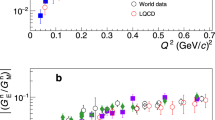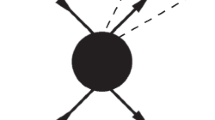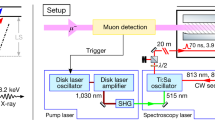Abstract
SEVERAL authors1 have suggested that negative protons (p−) may be emitted from (β−-radioactive nuclei which emit a delayed neutron (n−0). (In our notations for the particles, the upper index refers to the charge, the lower one to the magnetic moment.) Some unsuccessful attempts2 at detection have been made. This suggestion has originated from the fact that the rest energies of the neutron and an electron ε− are together greater than that of p− by 1.826 MeV. It will be shown in this communication that the above suggestion is unfounded.
This is a preview of subscription content, access via your institution
Access options
Subscribe to this journal
Receive 51 print issues and online access
$199.00 per year
only $3.90 per issue
Buy this article
- Purchase on Springer Link
- Instant access to full article PDF
Prices may be subject to local taxes which are calculated during checkout
Similar content being viewed by others
References
For example, Kuan-Hun-Sun, Phys. Rev., 76, 1266 (1949).
Feather, N., at Edinburgh Conference (Nov. 14, 1949).
Michel, L., Proc. Phys. Soc., 63, 514 (1950).
Majorana, E., Il Nuovo Cimento, 14, 171 (1937).
Møller, C., and Rosenfeld, L., Det Kgl. Dansk., 17, No. 8 (1940).
Author information
Authors and Affiliations
Rights and permissions
About this article
Cite this article
MICHEL, L. Reactions between Nucleons and Mesons, and the Search for Negative Protons. Nature 166, 654–655 (1950). https://doi.org/10.1038/166654a0
Issue Date:
DOI: https://doi.org/10.1038/166654a0
Comments
By submitting a comment you agree to abide by our Terms and Community Guidelines. If you find something abusive or that does not comply with our terms or guidelines please flag it as inappropriate.



